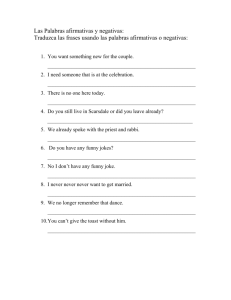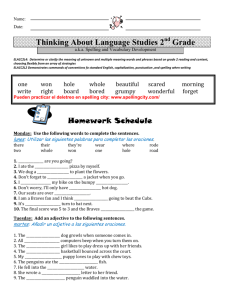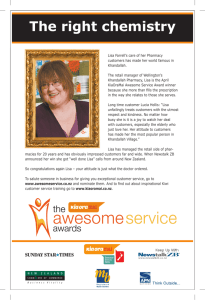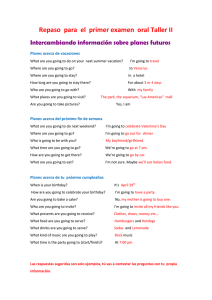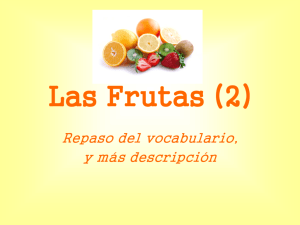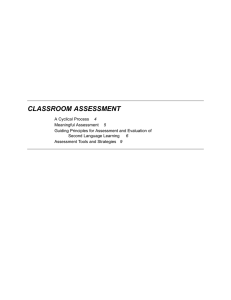programación de unidades didácticas
advertisement
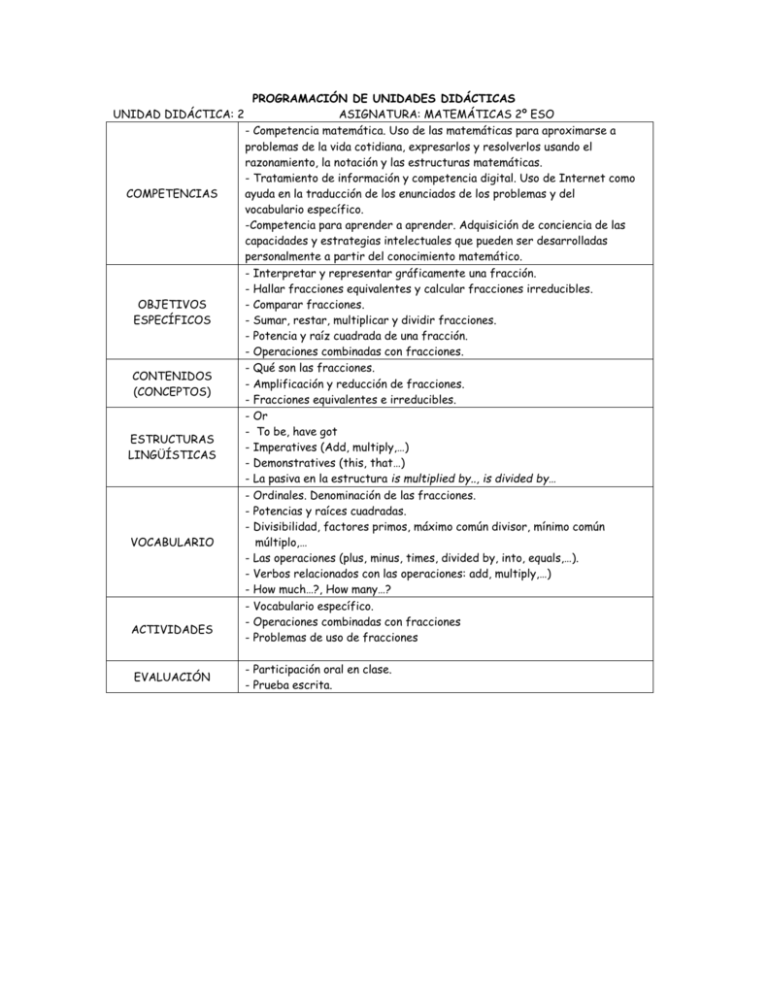
UNIDAD DIDÁCTICA: 2 COMPETENCIAS OBJETIVOS ESPECÍFICOS CONTENIDOS (CONCEPTOS) ESTRUCTURAS LINGÜÍSTICAS VOCABULARIO ACTIVIDADES EVALUACIÓN PROGRAMACIÓN DE UNIDADES DIDÁCTICAS ASIGNATURA: MATEMÁTICAS 2º ESO - Competencia matemática. Uso de las matemáticas para aproximarse a problemas de la vida cotidiana, expresarlos y resolverlos usando el razonamiento, la notación y las estructuras matemáticas. - Tratamiento de información y competencia digital. Uso de Internet como ayuda en la traducción de los enunciados de los problemas y del vocabulario específico. -Competencia para aprender a aprender. Adquisición de conciencia de las capacidades y estrategias intelectuales que pueden ser desarrolladas personalmente a partir del conocimiento matemático. - Interpretar y representar gráficamente una fracción. - Hallar fracciones equivalentes y calcular fracciones irreducibles. - Comparar fracciones. - Sumar, restar, multiplicar y dividir fracciones. - Potencia y raíz cuadrada de una fracción. - Operaciones combinadas con fracciones. - Qué son las fracciones. - Amplificación y reducción de fracciones. - Fracciones equivalentes e irreducibles. - Or - To be, have got - Imperatives (Add, multiply,…) - Demonstratives (this, that…) - La pasiva en la estructura is multiplied by.., is divided by… - Ordinales. Denominación de las fracciones. - Potencias y raíces cuadradas. - Divisibilidad, factores primos, máximo común divisor, mínimo común múltiplo,… - Las operaciones (plus, minus, times, divided by, into, equals,…). - Verbos relacionados con las operaciones: add, multiply,…) - How much…?, How many…? - Vocabulario específico. - Operaciones combinadas con fracciones - Problemas de uso de fracciones - Participación oral en clase. - Prueba escrita. UNIT 2: WORKSHEET ON FRACTIONS 1. Specific vocabulary. Translate the following words: Fraction: Numerator Denominator: Combined operations: Equivalent fraction: Irreducible fraction or fraction in lowest term: 2. John’s hobbies. John likes to collect soccer picture cards. He has 800 picture cards, 2/16 of them are Real Madrid’s, 1/4 of them are Betis’ and 5/8 of them are Barça’s. How many picture cards of each team does he have? 3. Calculate the following arithmetic expressions: a) (-1/2):3/4-(-3/2) = b) 3/3*(-4/2)-(-5/3)+(1/4) 4. Arrange the following fractions from the greatest to the least: a) 4/2, 3/5, -3/4, -1/2 b) 2/5, -4/3, 5/6, -3/4 5. a 1/2 3/2 -3/5 1/8 Complete the following table: b -2/3 7/6 -2/5 3/6 c 1/4 -1/5 3/4 1/2 a+b*c a*c-b a*b:c a:(-b)+1 a+b-c 6. John´s Halloween. In Halloween John got a vampire costume and went out with his friends Bartholomew and Lisa Simpson knocking on doors for trick-or-treat. They got 90 pieces of candy. They shared their haul as follows: John took 1/3, Bart 1/3 of the remaining candy, and then Lisa 1/3 of the remainder. How many pieces of candy are left for Homer, Marge and Maggie? 7. John´s riddle. Jonh likes to challenge Lisa´s intelligence. He told Lisa: - Lisa, I have an amount of money in my wallet that you have to guess. If you solve this riddle I will allow you to ride my new bicycle. The clue is that if I add up its own half to this amount plus a fifth plus €1, then I will have enough to buy my €324 bicycle. 8. For smart kids. Arrange this fractions 1/A, 1/B, A/B, (A+B)/B by knowing that A and B are two natural numbers that A<B<A2 .
